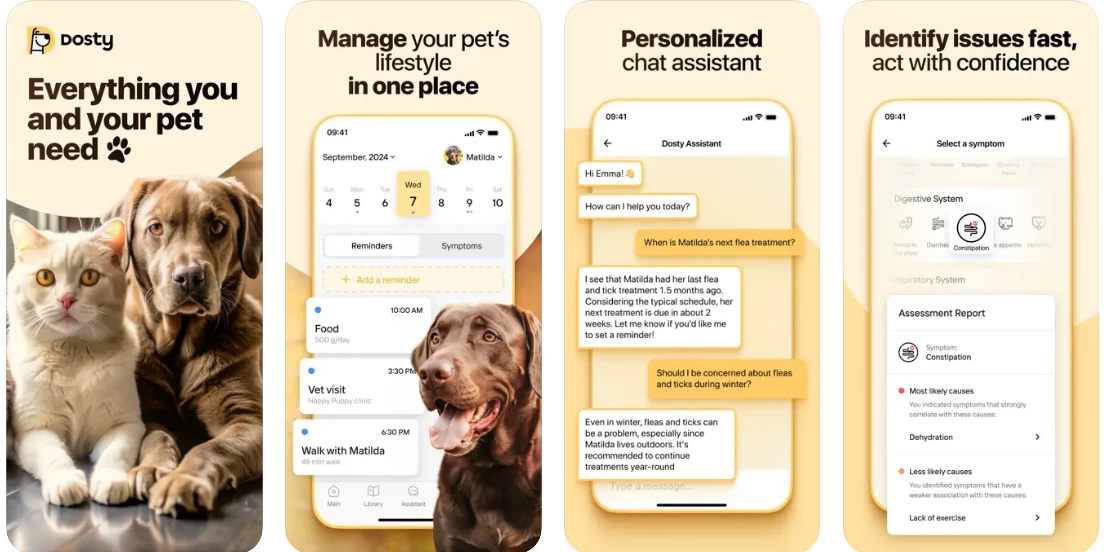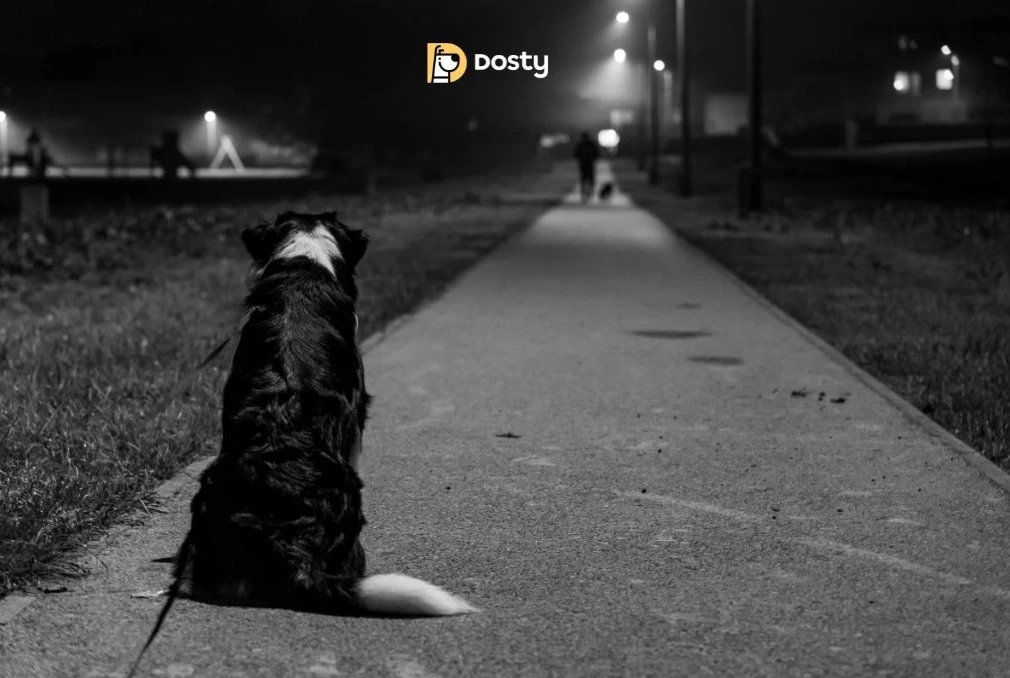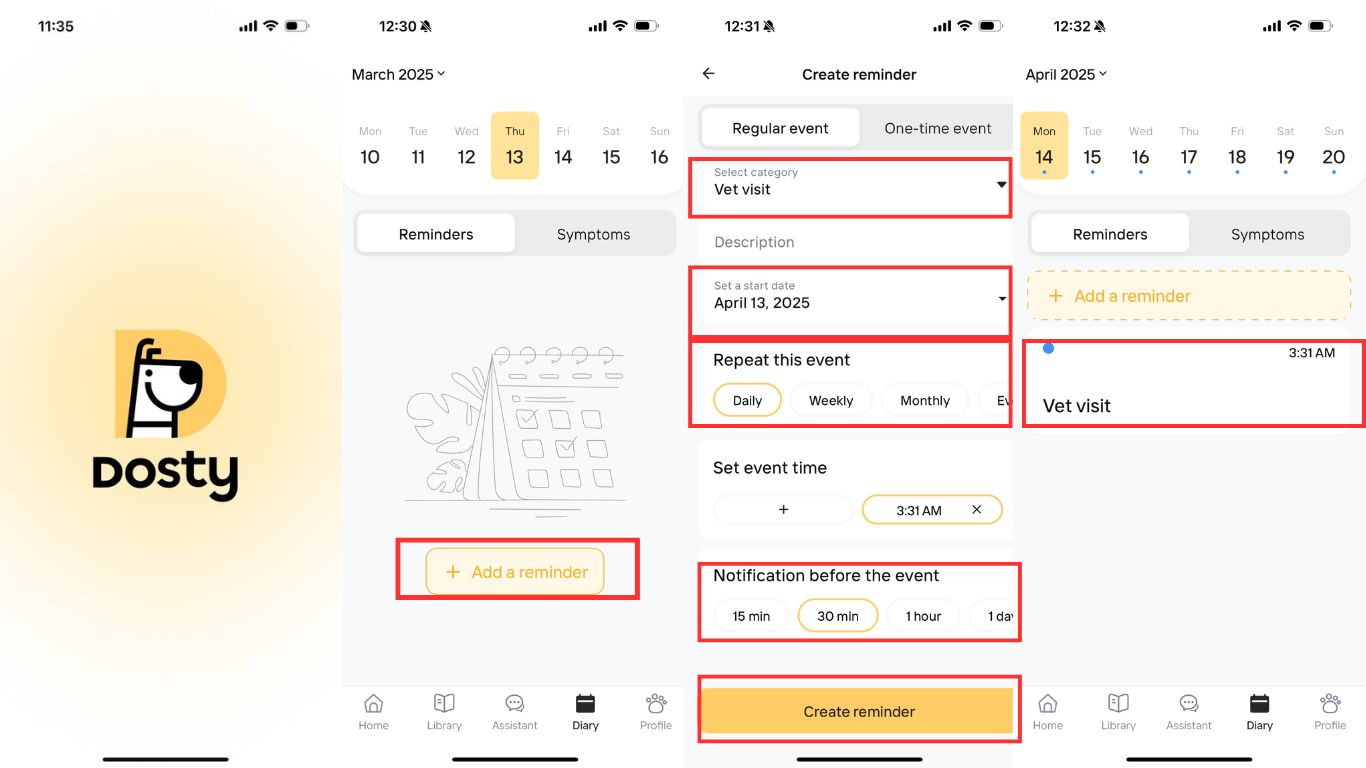On this page
Why Do Dogs Howl at Night?
The primary reasons for dogs howling at night are for them to express anxiety, pain, environmental factors, puppy cries, a call of the wild and communication. Whether due to loneliness, pain, or the occasional nearby siren, dogs have been known to howl at night when they’re feeling a particular unmet need.
In many cases, it’s normal. Howling is natural, especially in vocal breeds like Beagles and Huskies. But if it's frequent, or if it's starting to interfere with a child's daily life, it could be a sign of a behavioral or medical problem that needs treatment, such as a food allergy or ADHD.
“There’s usually a message when dogs are howling in the middle of the night,” says Dr. Carling Matejka, DVM.
If your dog’s nighttime howling feels like a mystery, it’s time to stop guessing❗
Dosty assists you in monitoring your symptoms, eliminating health issues and receive the personalized support to bring peace back to your nights.
📲 Understand what your dog’s trying to say with Dosty.

Is Nighttime Dog Howling a Natural Behavior?
Yes, howling is a trait passed down from wolves, a genetic behavior that is employed to communicate one’s location or to repel others. There are also dogs who howl at far away sounds, such as music, ambulances, or other dogs, while sleeping as well.
This is very applicable to working, guard or hunting breeds. Sometimes the baying is the occasional howl but should it start happening frequently or intensifying you may need to explore this further.
Can Dog Howling Be a Sign of Separation Anxiety or Loneliness?
Yes, dogs with separation anxiety or loneliness howl when they are left alone or kept in separate rooms away from their owners. This is particularly common in the evening when the home grows quiet and dark.
More than 20% of dogs in the world have separation-related behaviors and howling is one of the most common. This type of distress is more common in puppies, adopted dogs and high-bonding breeds.
“Dogs, when they become separated, vocalize as we do,” explains Dr. Juan Sebastian Orjuela, DVM.
❗When your dog howls because of loneliness, it’s more than noise, it’s a cry for connection.
Dosty Symptom Checker and Chat Assistant help you determine what your dog is actually feeling and provide personalized support for separation anxiety.
📲 Give your dog peace of mind, even when you’re away.

Do Dogs Howl at Night Because of Noises or Other Animals?
Absolutely, strange or high-pitched noises after dark cause dogs to howl. Sirens, other dogs barking, or wild animals such as owls or raccoons might set off howling.
Your dog’s sense of hearing is much more acute than your own. Sounds you can’t even hear might be disrupting sleep and eliciting cries. If the dog is howling with the environment, you may attempt to minimize the stimuli with white noise or soundproofing.
Explore blogs, breed insights, and expert advice on Dosty.co!
Could Pain or Medical Issues Cause Dog Howling at Night?
Yes, pain, cognitive decline or physical discomfort may prompt a dog to howl in distress, especially through the night when symptoms may exacerbate or when they are by their lonesome.
Older dogs may have canine cognitive dysfunction (CCD) which can affect their sleep patterns and may lead to night wandering. Vocalization may also result from other health disorders such as arthritis, gastrointestinal discomfort or infection.
How to Stop a Dog From Howling at Night?
To stop your dog from howling at night, you need to pinpoint the cause, be it environmental, emotional, or medical. When you know the reason, you can fight it with efficient strategies to limit or erase the habit.
It begins with a soothing, ritualized bedtime routine that offers stability and security. Give your dog one last chance to relieve himself outside, a light snack and a comfortable environment to sleep in. Use calming aids such as:
🟢 A white noise machine
🟢 A soft item with your smell
🟢 Vet recommended Pheromone diffuser
Be sure your dog is having adequate daytime physical and mental stimulation. Restlessness sometimes results from being bored at night.
If anxiety is a factor, don’t respond to howling with punishment. Rather, pay no attention to attention-seeking howling and reward moments of silence with treats or praise.
“Behavior change isn’t instant, but the predictability of bedtime can help most dogs to settle,” says Dr. Susan Ettinger, DVM.
What Are the Best Training Techniques for Reducing Dog Howling?
The most effective training techniques rely on positive abstract reinforcement coupled with environmental desensitization. These methods show dogs what to do to get a reward and will lower reactivity to triggers.
The Best Training Techniques to Stop Your Dog Howling at Night:
✔️ Reinforce calm moments – Reward calm, quiet behavior with treats.
✔️ Provide a ‘quiet’ cue – This command should be taught and linked to rewards over time.
✔️ Discourage Excessive Howling – Do not reward with attention.
✔️ Crate comfort practice – Turn the crate or bed into a positive place of rest.
✔️ Offer evening enrichment – Offer another safe chew toy or puzzle feeder prior to bed to help slow down and relax the mind.
✔️ Counter condition – If you have sound recording of your dog at his/her worst play it at lower volume and build up, rewarding calm behaviour.
Sick of their nocturnal howling and sleepless nights❓
Dosty’s step-by-step training guides reveal, in just minutes a day, how to stop the chaos, using vet-approved methods that really work.
👉 Mute that noise, forever, with Dosty.
When to Consult a Veterinarian or Behaviorist About Dog Howling?
Consult a veterinarian or qualified behaviorist if howling is excessive, sudden or continues over time. Some behaviors are a result of medical problems or lingering stress.
When to Consult a Vet for Dog Howling:
🔴 The howling begins suddenly in an adult or senior dog
🔴 It interrupts family sleep several nights a week
🔴 Or it comes accompanied by pacing, limping, confusion or digestive symptoms
🔴 You’ve exercised but haven’t seen any progress in 2–3 weeks
🔴 The dog seems to be anxious and afraid of everything.
Missing vet visits hurts you more than your dog❗
Dosty’s smart reminders keep everything on schedule, without the mental load.
FAQs About Dog Howling at Night
1. Is night time howling normal for puppies?
Yes, especially when crate training or when early on in the adjustment period. It commonly clears with uniformity.
2. Do all breeds howl?
Not necessarily, some breeds, such as Huskies and Beagles, are more vocal than others who barely howl at all.
3. Can boredom cause howling?
Yes, boredom and especially in working breeds can cause night time vocalization.
4. Will getting another dog stop the howling?
Not always. It could help if you are lonely, but not if the issue is medical or fear-related.
5. Is medication ever used?
Vets may also suggest short- or long-term medication for some anxiety or cognitive decline cases.
Conclusion – Helping Your Dog Howl Less and Sleep Peacefully at Night
Dogs howling at night isn’t something to ignore, as it’s often a display of some form of discomfort, fear or a summon due to isolation. The first step toward peace between you and your dog is to discover why he howls.
By establishing a routine, meeting emotional and physical needs, and using positive reinforcement, most canine psyches can settle themselves down for a full night's rest. Many of them might require professional assistance, and that’s fine.


